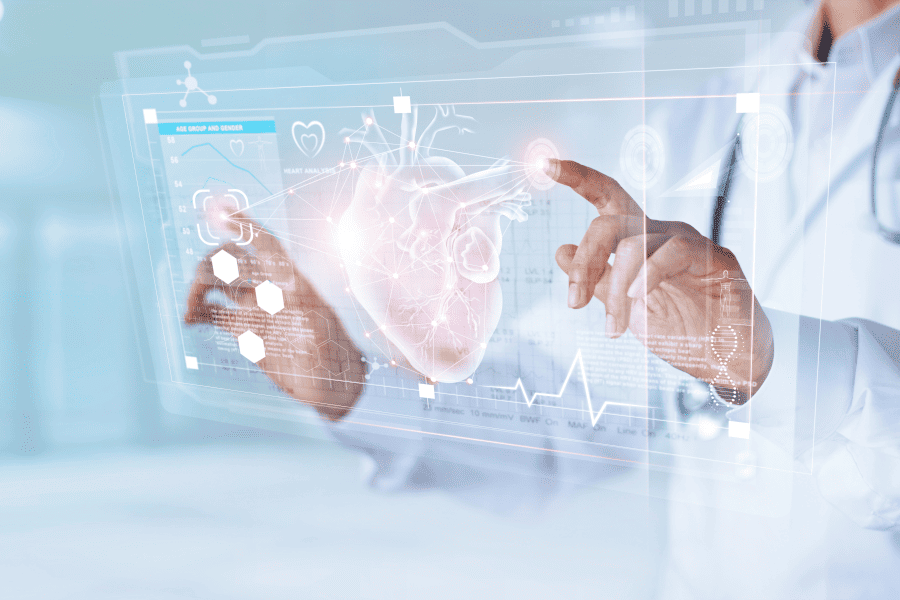End-stage renal disease (ESRD) is the last stage of chronic kidney disease (CKD) where the kidneys no longer function well enough to meet the needs of daily life and cannot maintain the body’s internal equilibrium. Patients with ESRD require dialysis or a kidney transplant to survive.
Overview
The kidneys, each about the size of a fist, are responsible for filtering out waste and excess fluids from the body. When they are no longer able to efficiently do this due to prolonged damage, ESRD results. It’s a serious condition that can stem from multiple causes and carries significant morbidity and mortality if not adequately managed.
Symptoms
The manifestation of ESRD is a culmination of worsening kidney function symptoms, which include:
- Fatigue and general weakness
- Nausea or vomiting
- Shortness of breath
- Swelling of ankles, feet, and hands
- Persistent itching
- Muscle cramps
- Chest pain or pressure
- Loss of appetite
- Difficulty in concentrating
- Darkened skin
Causes
Several diseases and conditions can cause or hasten the journey towards ESRD, including:
- Chronic hypertension
- Diabetes, especially Type 2
- Chronic glomerulonephritis
- Polycystic kidney disease
- Severe infections
- Prolonged urinary tract obstructions
Risk Factors
Certain factors can predispose individuals to ESRD, such as:
- A family history of kidney disease
- Age, especially those above 60
- African, Asian, or Native American descent
- Smoking or tobacco use
- Obesity
- Abnormal kidney structure from birth
Avoidance and Prevention
Taking proactive measures can slow the progression to ESRD or prevent it altogether:
- Manage underlying conditions like diabetes and hypertension.
- Adopt a kidney-friendly diet, low in sodium and processed foods.
- Regular exercise, but consult a physician first.
- Avoid smoking and limit alcohol intake.
- Regular check-ups to track kidney function.
When to See the Doctor
It’s essential to seek medical attention when:
- Symptoms of reduced kidney function appear.
- There’s a history of risk factors.
- Routine tests show elevated creatinine or reduced glomerular filtration rate (GFR).
Additional Information
The road to ESRD is gradual, with kidneys weakening over time. Early detection and treatment can prolong kidney function and improve the quality of life. Dialysis, where a machine filters blood, is a common treatment, but a transplant remains the definitive solution.
While kidney transplants are effective, the waiting list can be long, underscoring the need for preventive measures. Moreover, patients with a transplant require lifelong medication to prevent organ rejection, which can have side effects.
It’s essential to approach ESRD with a multidisciplinary strategy, encompassing nephrologists, dieticians, therapists, and support groups. This approach ensures physical, emotional, and nutritional needs are met.
Diagnosis
Diagnosing ESRD involves a series of tests:
- Blood Tests: Measures the amount of waste products, like creatinine and urea, in the blood.
- Urine Tests: Analyzing a sample of urine can help discover abnormalities that point towards kidney disease.
- Glomerular Filtration Rate (GFR): This test measures how efficiently your kidneys are filtering wastes from the blood. A low GFR indicates diminished kidney function.
Complications
ESRD can lead to a host of complications, both from the disease itself and from its treatments:
- Anemia: Reduced kidney function affects the production of the hormone erythropoietin, leading to a decreased red blood cell count.
- Bone Diseases: The kidneys may no longer balance the calcium and phosphate levels, leading to bone problems.
- High Blood Pressure: Fluid buildup due to impaired kidney function can raise blood pressure.
- Fluid Overload: ESRD can cause edema, fluid in the lungs, and even heart failure.
- Hyperkalemia: Elevated potassium levels in the blood can affect heart health.
- Pericarditis: The membrane surrounding the heart (pericardium) can become inflamed.
- Malnutrition: Appetite loss can lead to inadequate food intake.
- Neurological issues: ESRD can lead to difficulty in concentrating, seizures, or even coma.
Treatment Options
- Hemodialysis: Blood is routed through a machine that filters out wastes before returning it to the body.
- Peritoneal Dialysis: Uses the lining of the abdominal cavity to filter the blood. A solution is filled in the abdomen, absorbs waste, and then is drained after some time.
- Kidney Transplant: A donated kidney replaces the nonfunctional one. A successful transplant may eliminate the need for dialysis.
Lifestyle Adjustments
- Dietary Changes: Limiting fluids, eating a low-protein diet, and restricting salt, potassium, phosphorous, and other electrolytes.
- Medications: Blood pressure medications, vitamins, and medicines that treat anemia, bone disease, and high potassium.
- Avoidance of NSAIDs: Over-the-counter painkillers can damage the kidneys further.
The Emotional Toll
ESRD and its treatments can significantly impact one’s mental well-being. Many patients report feelings of depression, anxiety, and undergo emotional distress. Seeking therapy and joining support groups can be beneficial.
Economic Considerations
Dialysis treatments are costly, and a kidney transplant, while potentially curative, comes with significant upfront costs and lifelong medications. It’s essential to explore health insurance options, national or regional aid programs, and charitable institutions that can assist with the financial burden.
End-stage renal disease is a severe medical condition, but with early detection, proper management, and lifestyle adaptations, patients can lead fulfilling lives. Awareness, regular check-ups, and commitment to a kidney-friendly lifestyle remain the best defensive strategy against ESRD’s debilitating progression.









